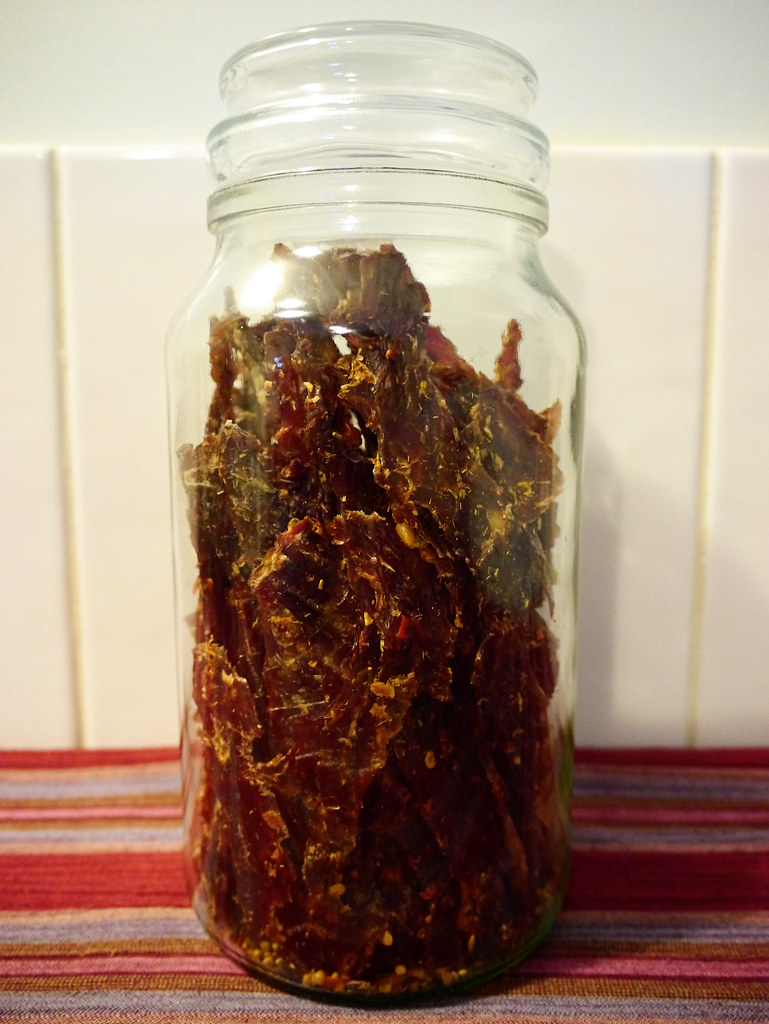
Beef Jerky Recipe #1
[dropcap]The[/dropcap] sign said cattle and sheep ahead (or more appropriately, beef and lamb) and in today’s post, one half of the sign is proved true in the form of not one but two beef jerky recipes! [Insert happy beef jerky dance here.]
Let me start by stating that out of all the snack foods in the world, on an equal par with Smith’s crinkle cut original crisps, one of my favourite snacks, especially as a beer/drink snack at a pub or party, would have to be packet sealed sticks of tasty/savoury beef jerky.
For me, there’s just something irresistibly enjoyable and addictive about gnawing, chewing, munching and giving the old jaw/canines a good work out with chewy flavour-packed strips of beef meat, well seasoned with a spectrum of herbs and spices (depending on the maker’s special brew), and then washing it down with a generous gulp of icy cold lager. Ahhh!
My addiction with seasoned dried beef strips stem back many years ago, when I was brought up on a Lao diet consisting of sticky rice (khao neow) and sometimes, home made Lao-style dried beef, venison or fish. Both mum and dad were and still are (god bless them) great home cooks, but it was mum who specialized in making her famed and prized dried meat and fish jerky creations (including sien hang, sien savanh and pa hang). Yumm!!

Dad made a selection of dried meats too, but he ventured more into the realms of dried ox skin and tendon. Still pretty tasty (especially when grilled!) but more reserved as a tough jaw building/breaking workout or a fundamental/textural ingredient in some Lao classic recipes, such as meaty stews/soups.
Both dried meat and dried fish are popular Lao delicacies. They’re great to have as a snack solo, with a big steaming hot ball of sticky rice, or as an accompaniment to many Lao meals/dishes. There are several variations/forms of Lao dried meats, including the distinctively sweet waffle thin/flat sheets of meat, usually sprinkled with sesame seeds (sien savanh), and the slightly sweet/more savoury long narrow rods/batons of dried flesh of varying sizes/lengths (sien hang) – similar to biltong/conventional savoury beef jerky.
I love both types of Lao beef jerky – any jerky for that matter. Although, I do think that the more savoury sien hang works best as an accompaniment with tum som/tum mark hoong (and khao neow). Whereas, the candy sweet sien savanh is great as a treat or paired with the versatile sticky rice.
Traditionally, Lao dried meats are sun/air dried. There’s really no complications about it except for keeping the flies/pests/local carnivores away. Usually a high drying location (either a custom made platform, clothesline/Hills Hoist), fly/moz/fish net, and a vigilant eye during the drying time will do the job just fine!
Another distinguishing feature about Lao dried meats is that it’s usually lightly flash fried in some hot oil or grilled before serving/eating. Heating/cooking the meat this way not only warms them up but it also intensifies the flavours, making them more enjoyable to eat.
Dried meat/beef jerky is popular across the world and there are so many variations and recipes. The two that I’ve shared in this post are not traditional Lao beef jerky/sien hang recipes but they are based on some of my favourite ingredients/flavours. They both taste amazing (of course) and make great accompaniments to both Lao dishes (including tum som and jeow) and a refreshing cold beer/bevvy. You can even enjoy them on your next trekking/camping/fishing trip for that substitute Bear Grylls wild feeling!!
If you prefer, you can lightly flash fry or grill them up for a crispy/heated touch, although I think they’re pretty much awesome as they are! I hope you’ll give them a try sometime soon. Sern saab dear friends!!
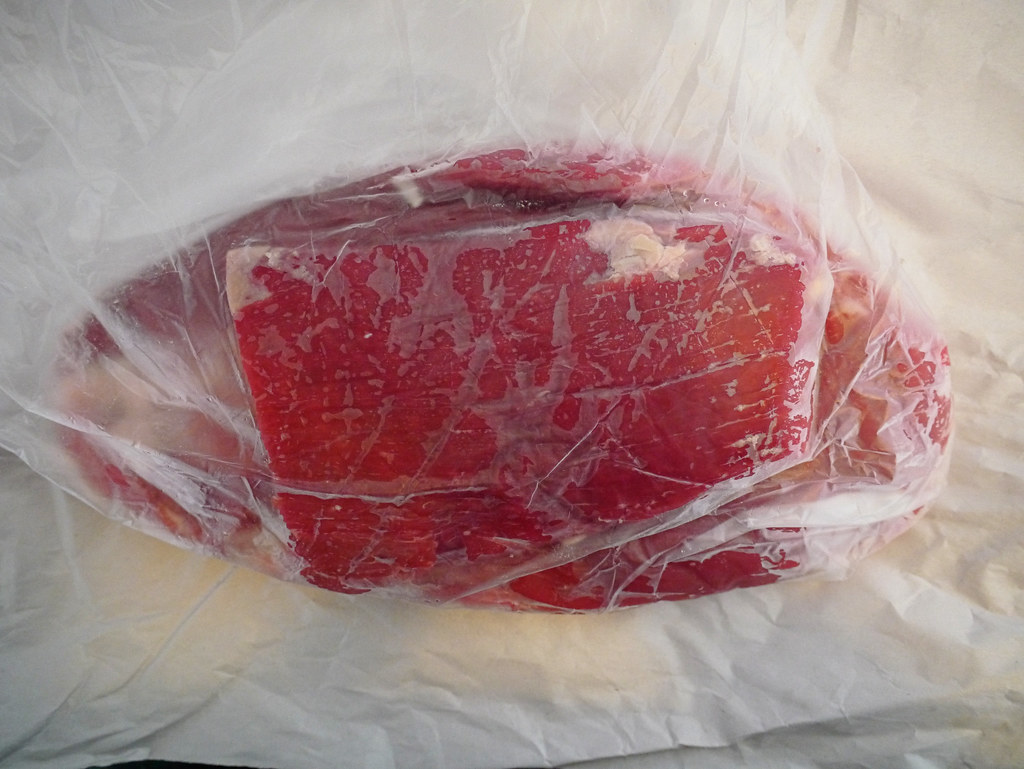
Place the flank steak in the freezer for 1 hour to firm it up and make it easier to slice.
1 kg of lean flank steak from our friendly butcher!
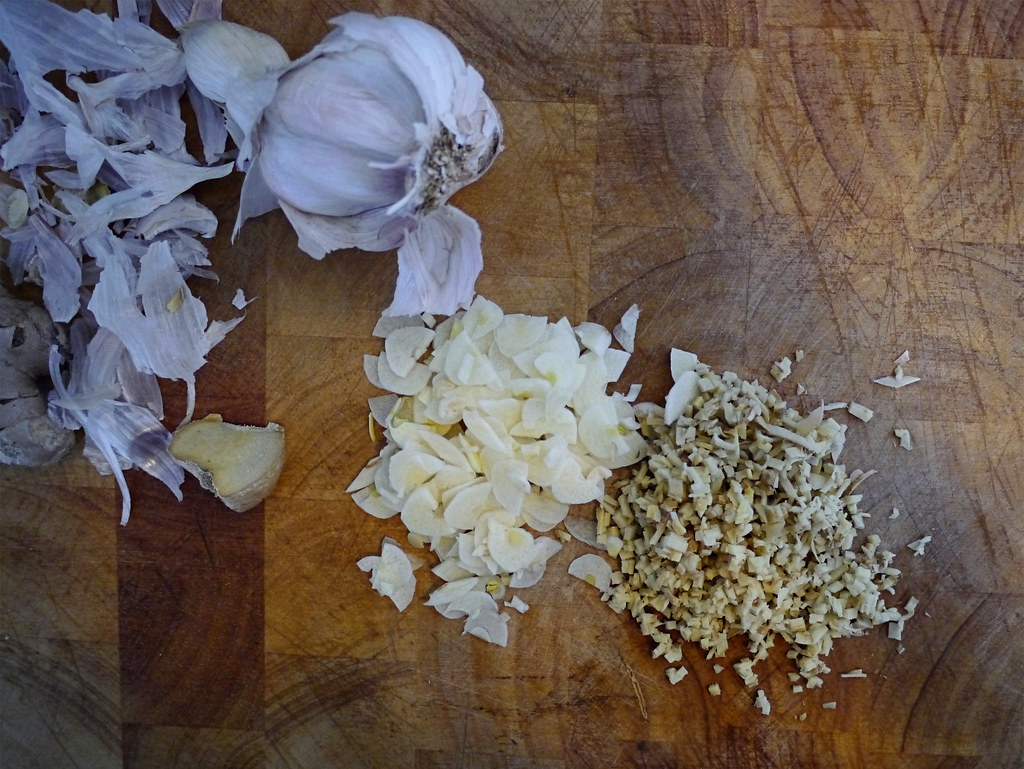
Finely slice/dice the garlic and ginger into small pieces.
2 of the holy trinity (my favourite/top 3 cooking ingredients) – garlic, ginger (and chili).
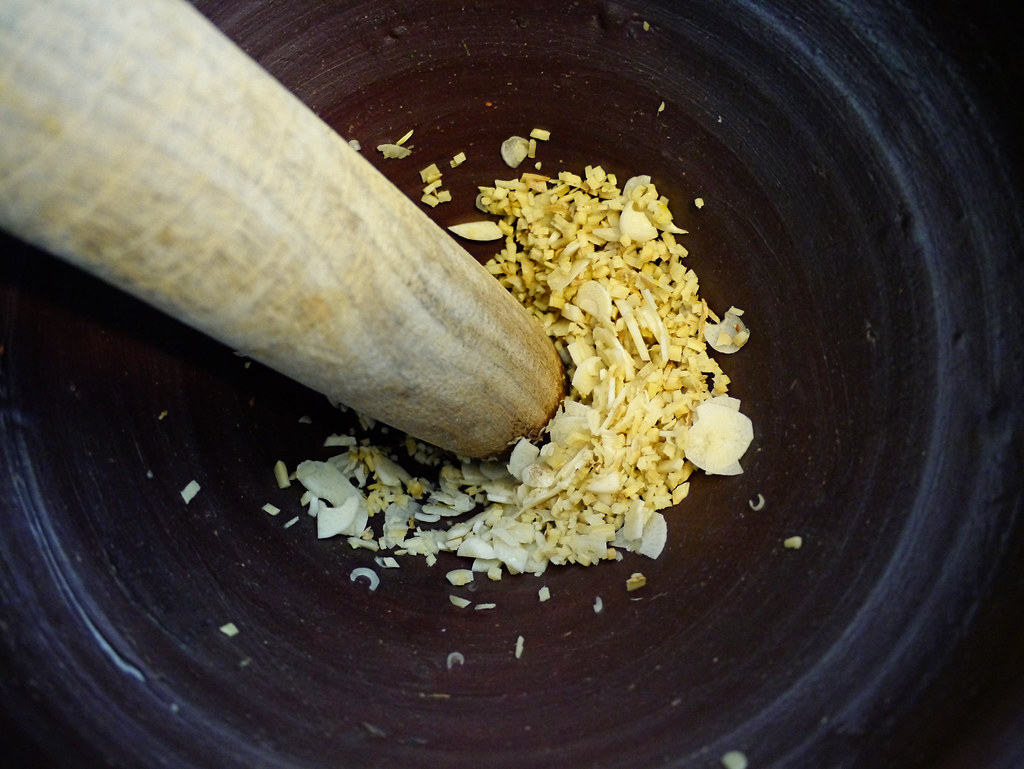
Pound with a mortar and pestle to a fine/minced consistency.
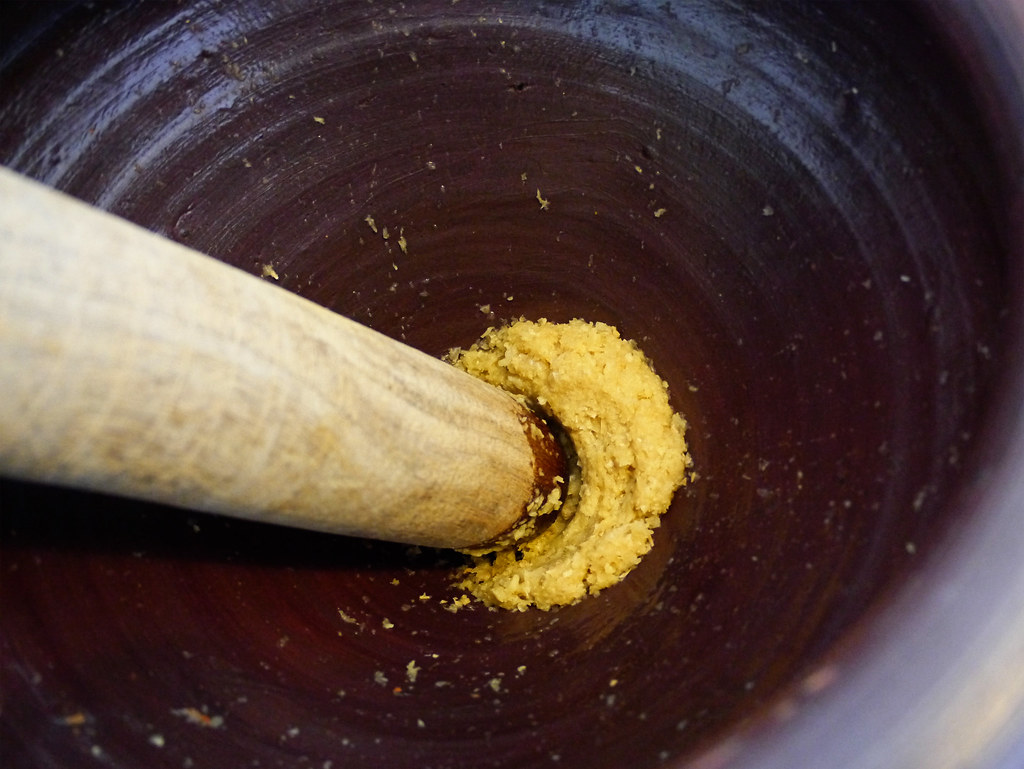
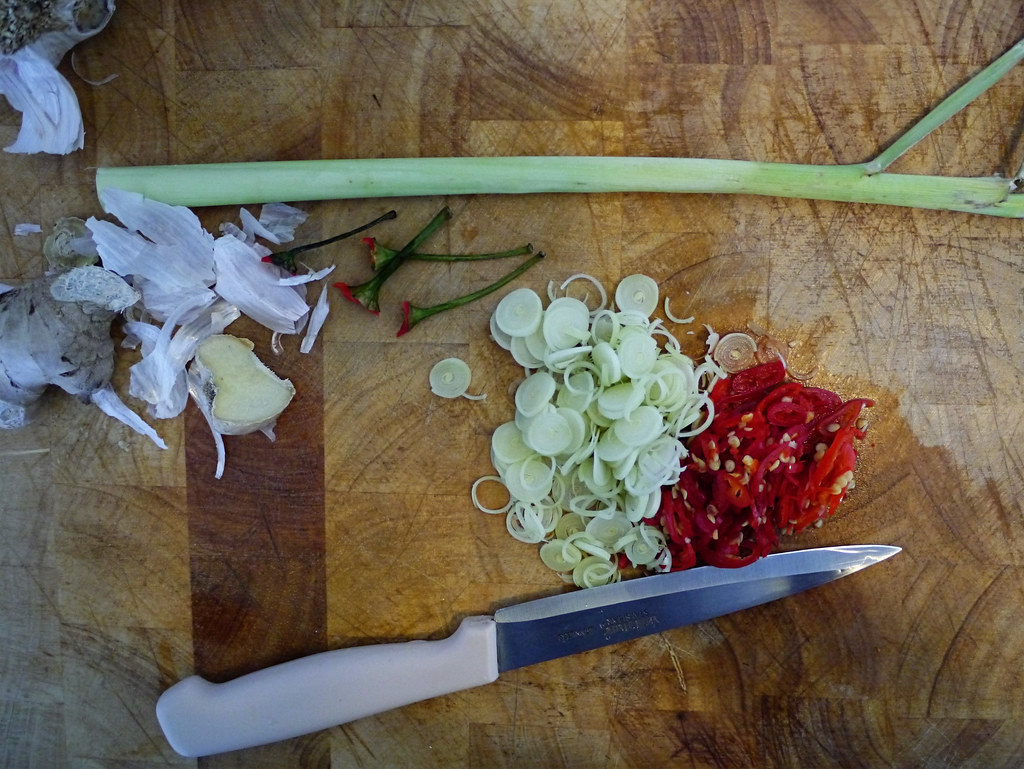
Finely slice/dice the fresh chilies and lemongrass into small pieces.
2 of my other favourite ingredients – lemongrass and fresh red hot chilies. Lemongrass pairs so well with Lao meat dishes (bbq, larb, beef jerky, etc.), amd chilies – well, chilies go well with almost everything in my book.
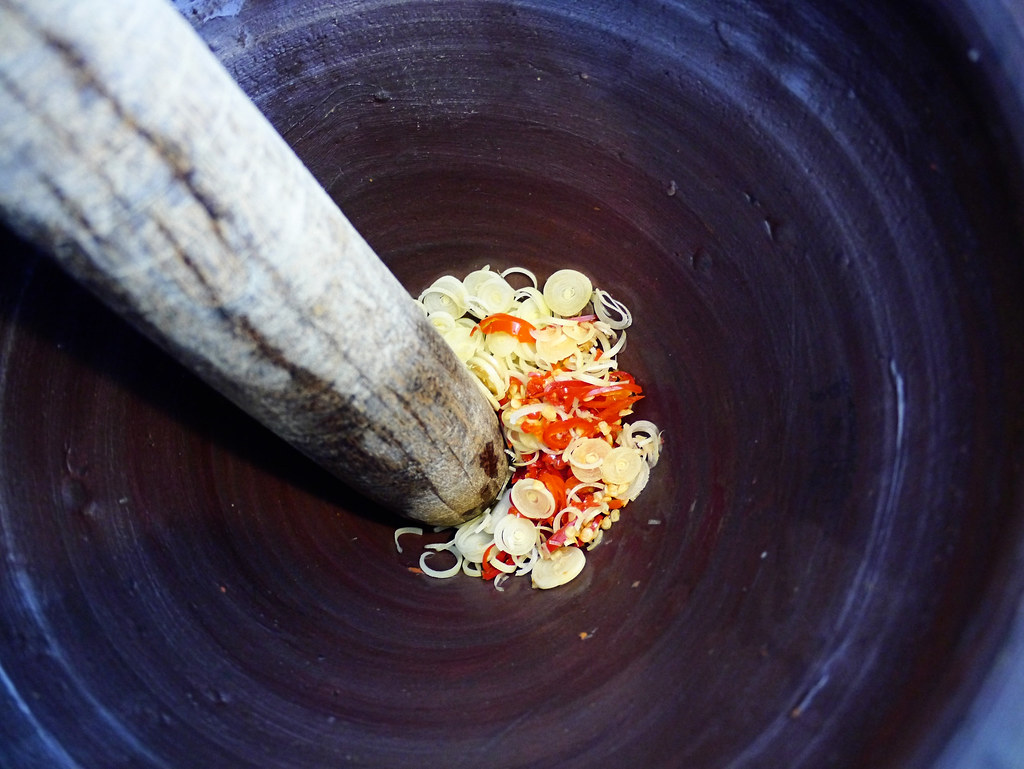
Pound with a mortar and pestle to a fine/minced consistency.
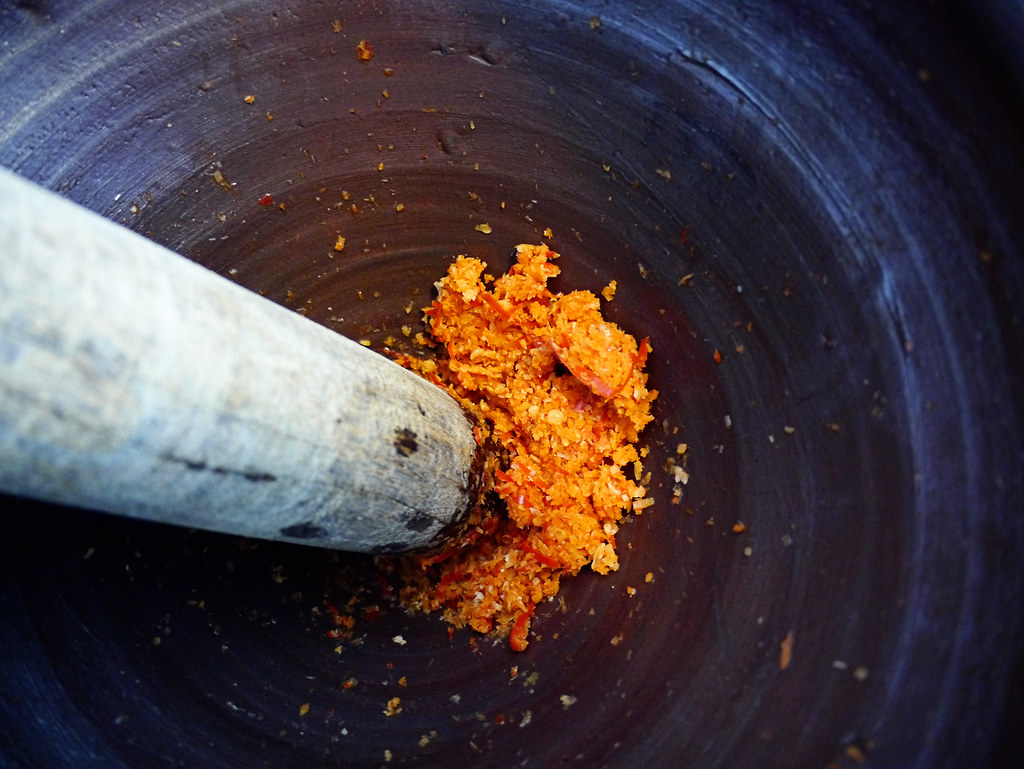
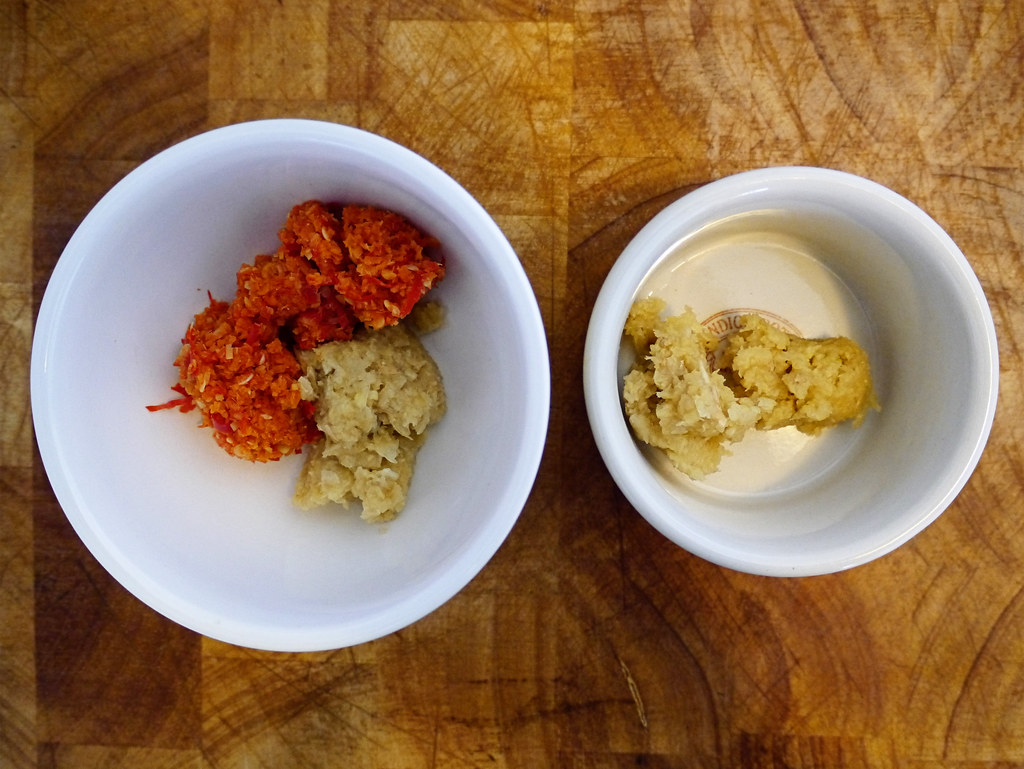
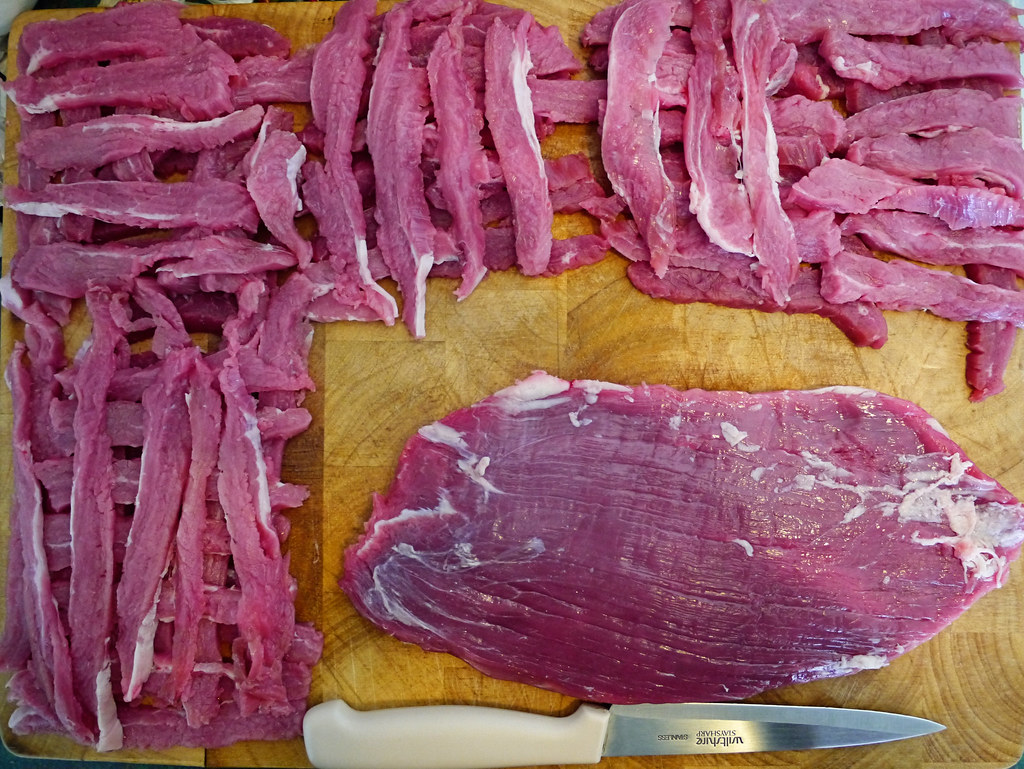
With a sharp/filleting knife, trim the fat/sinew off the flank steak if necessary. Then, thinly slice the steak into 5 mm strips. You can either cut across the grain or along the grain. I chose to cut across the grain to make the beef jerky easier to chew!
Note: For the 2 beef jerky recipes in this post, I used 1 kg (500 grams per recipe) of beef flank steak which is an ideal cut to make jerky with because it is fairly lean, flat, tender and holds well to marinating and drying. Although, most types of beef cuts will work just fine and there’s no harm in experimenting with different cuts of meat. Perhaps, you might want to experiment with using ox tongue as well? bigsmile Yummm – ox tongue jerky! If you have trouble finding flank steak, just ask your friendly butcher for it. Some people choose to trim the excess fat/sinew off the meat before drying because it can reduce the shelf life of the beef jerky. I’ve chosen not to do this with the following recipes because there really wasn’t that much fat on the meat. Also, because I’m such a big fan of beef jerky (seriously), they rarely last long enough to go bad anyway, and to be honest, I actually like/enjoy the taste of the dried fatty pieces on the jerky!! bigsmile If you’re worried about the fat on the meat ruining your dried jerky, simply trim it off with a sharp filleting knife when preparing the meat, or you can just lightly flash fry the dried beef jerky in some cooking oil or grill them before serving/eating. This is how traditional Lao beef jerky is made/served. This process will both lightly cook the dried beef and render the fat, at the same time impart a wonderful/delicious ‘cooked’ flavour/aroma/character to the jerky. I love both the cooked and just dried varieties. No complaints here when it comes to beef jerky!
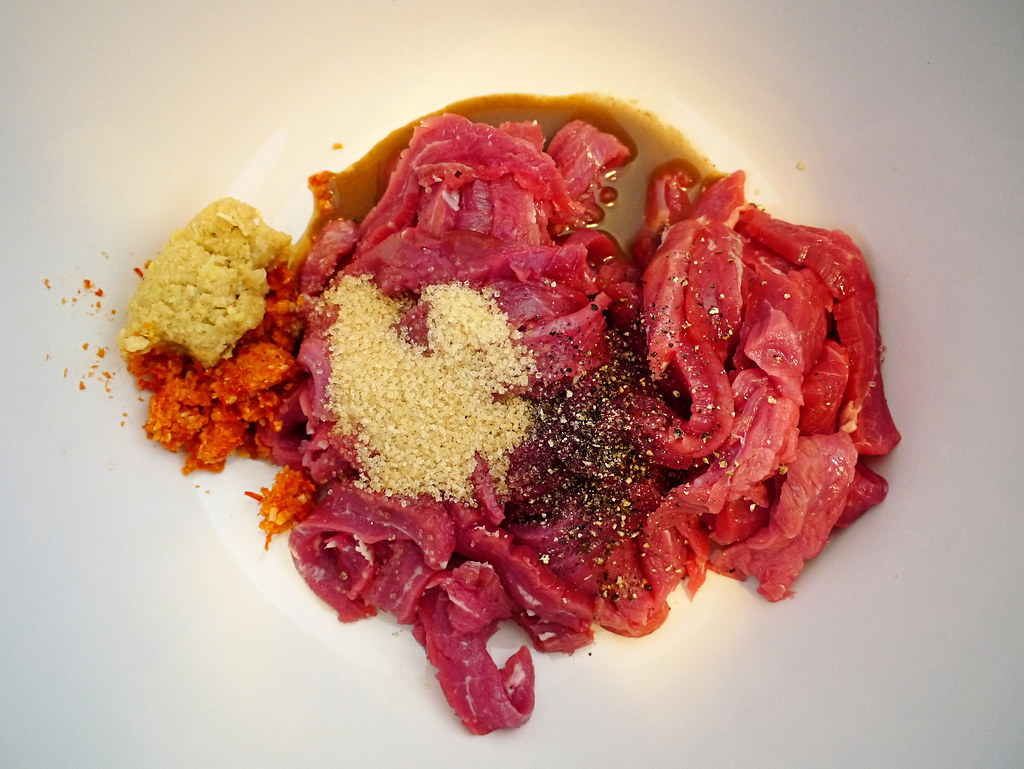
Place the beef strips in a mixing bowl. Add the pounded/minced garlic, ginger, fresh chilies and lemongrass. Add the cracked black pepper, fish sauce, padaek/fermented fish sauce and brown sugar.
Beef Jerky Recipe #1: 500 grams of sliced flank steak, 1 tsp of minced garlic, 1 tsp of minced ginger, 1 tsp of minced fresh red bullet chilies, 1 tsp of minced lemongrass, cracked black pepper, 2 TBSP of fish sauce, 1 TBSP of padaek/fermented fish sauce, 1 TBSP of brown sugar.

Gently mix the ingredients well together with your hand/fingers. Try not to break up/pull apart the beef strips when mixing.
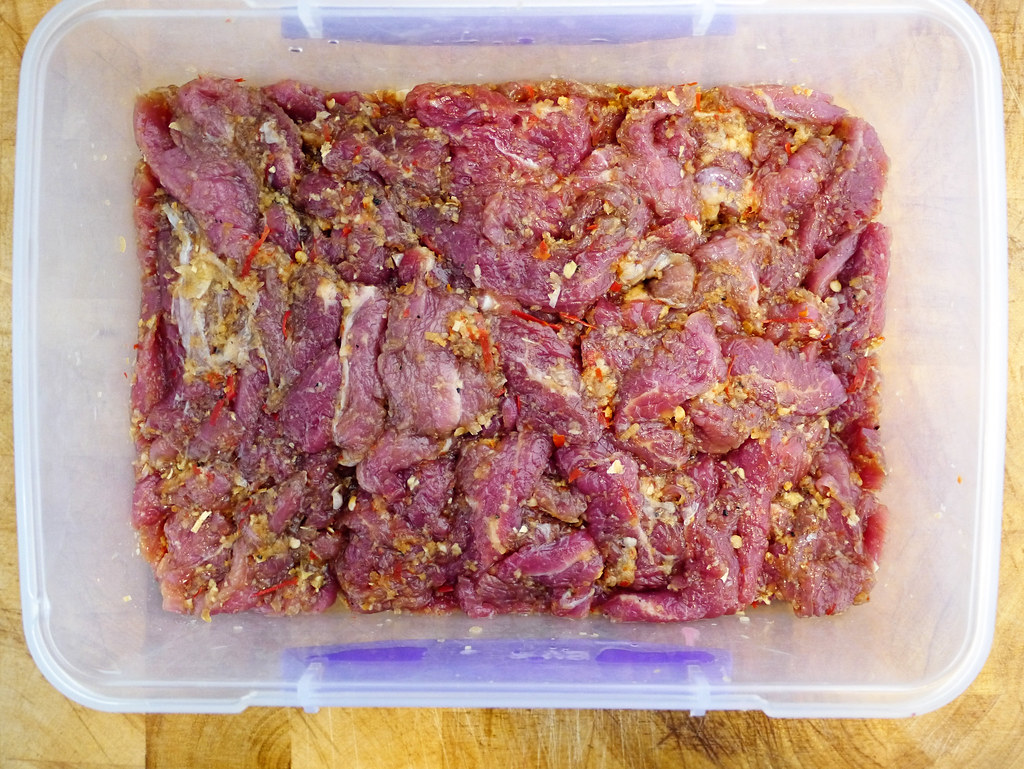
Place the mixed beef strips in a plastic container/zip lock bag and seal.
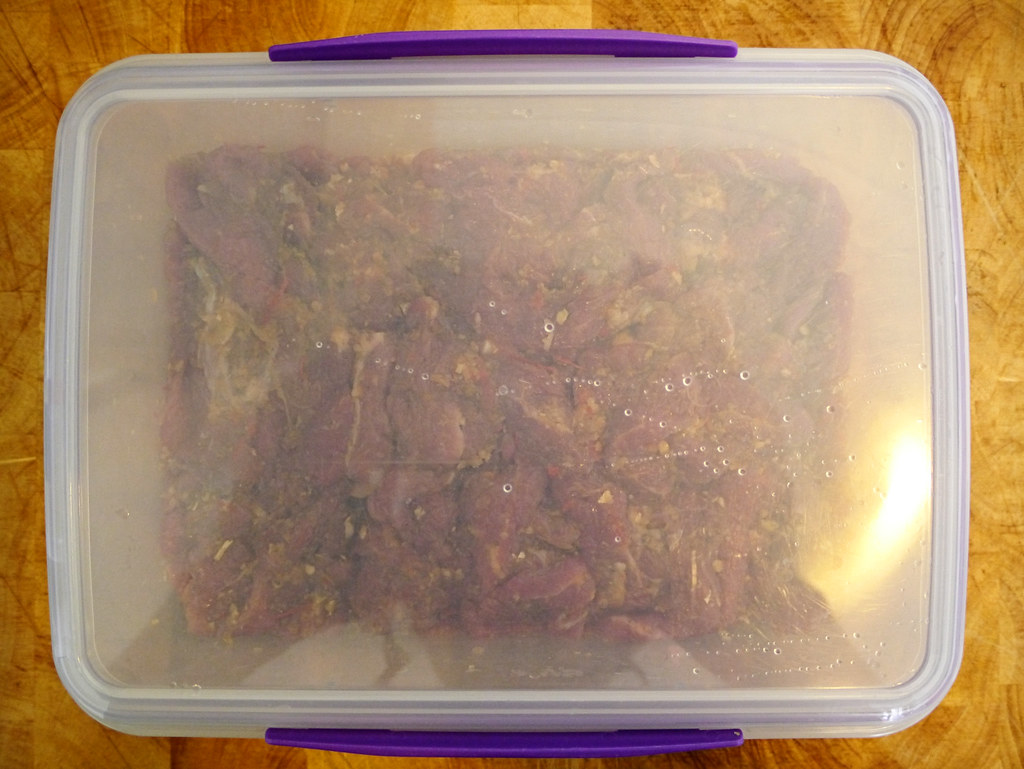
Place in the fridge and let the beef strips marinate for 12-24 hours (or overnight).
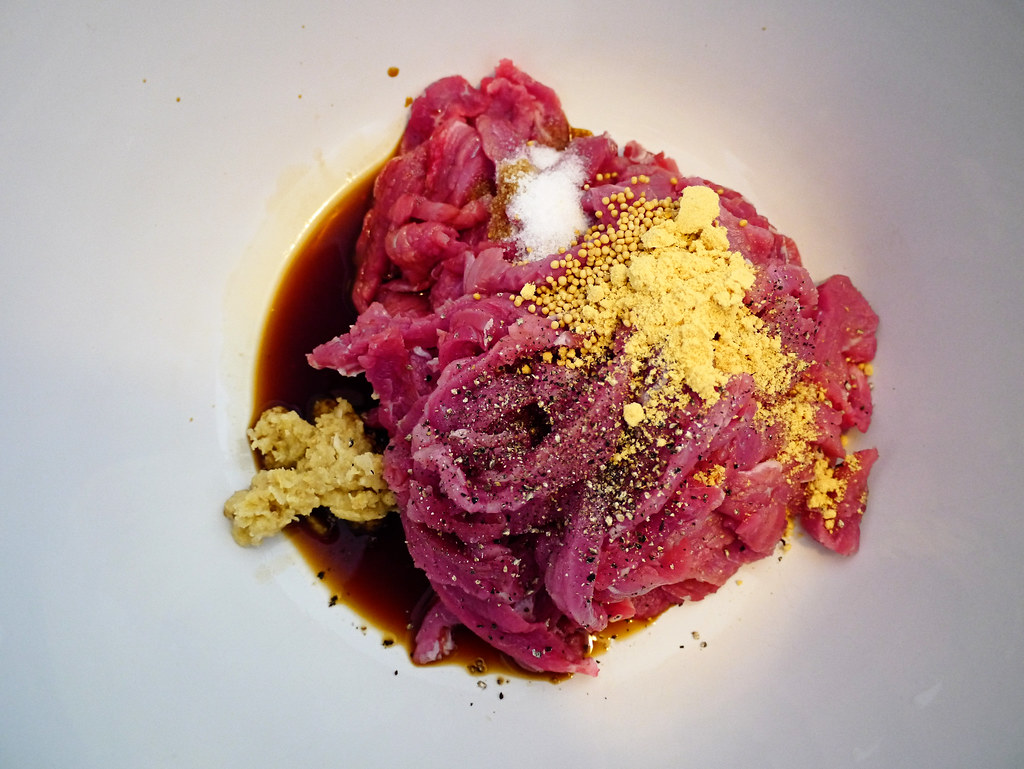
Beef Jerky Recipe #2: 500 grams of sliced flank steak, 1 tsp of minced garlic, 1 tsp of minced ginger, cracked black pepper, 2 TBSP of light soy sauce, 1 tsp of sea salt, 1 tsp of mustard powder, 1 tsp of yellow mustard seeds.
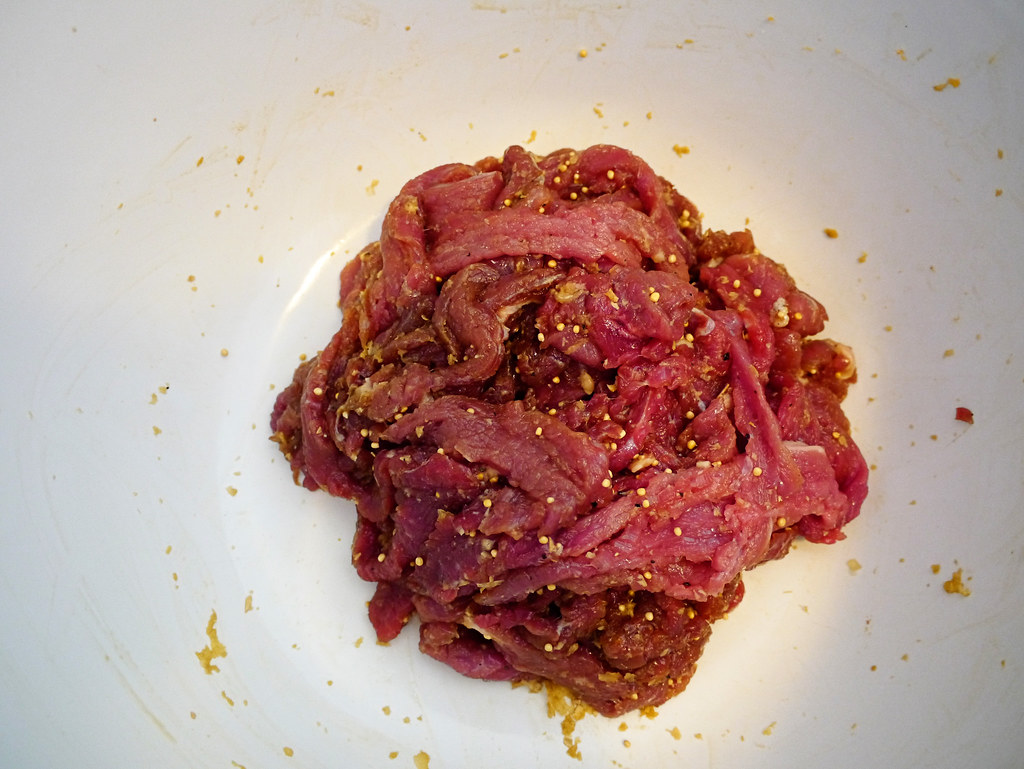
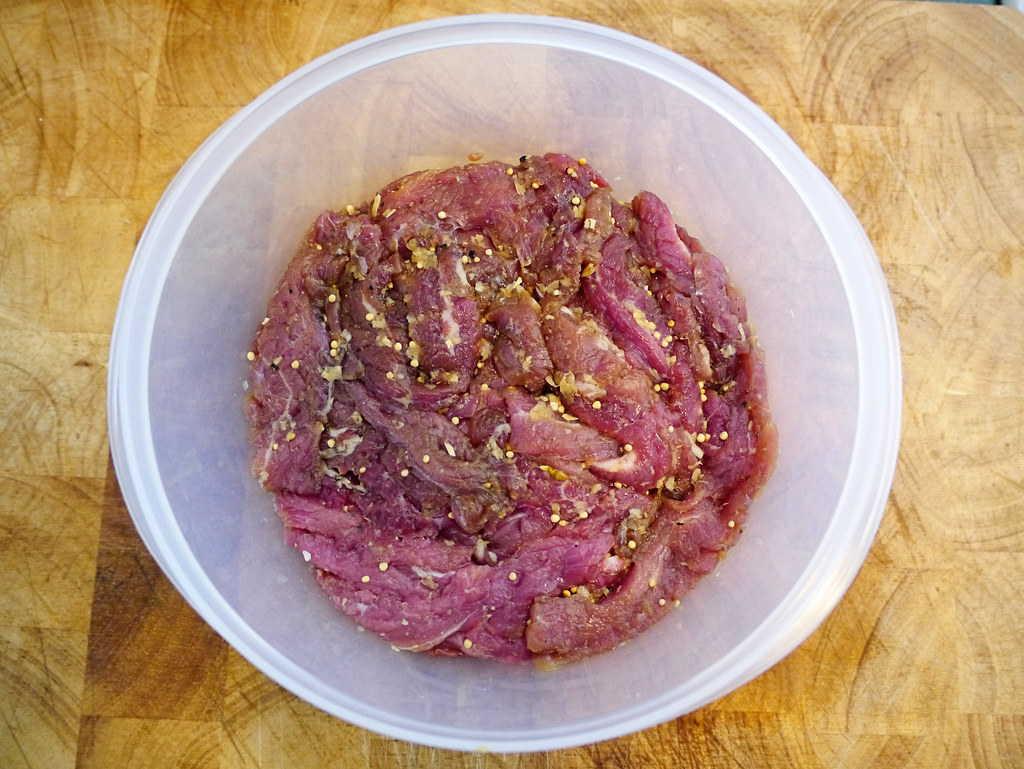
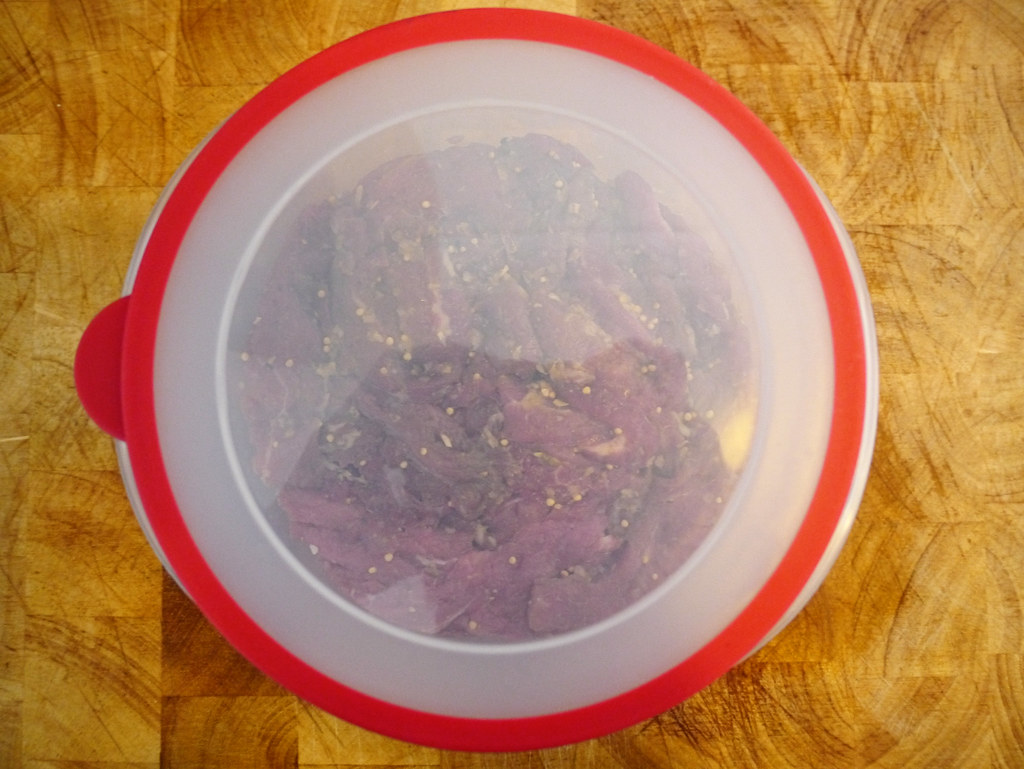
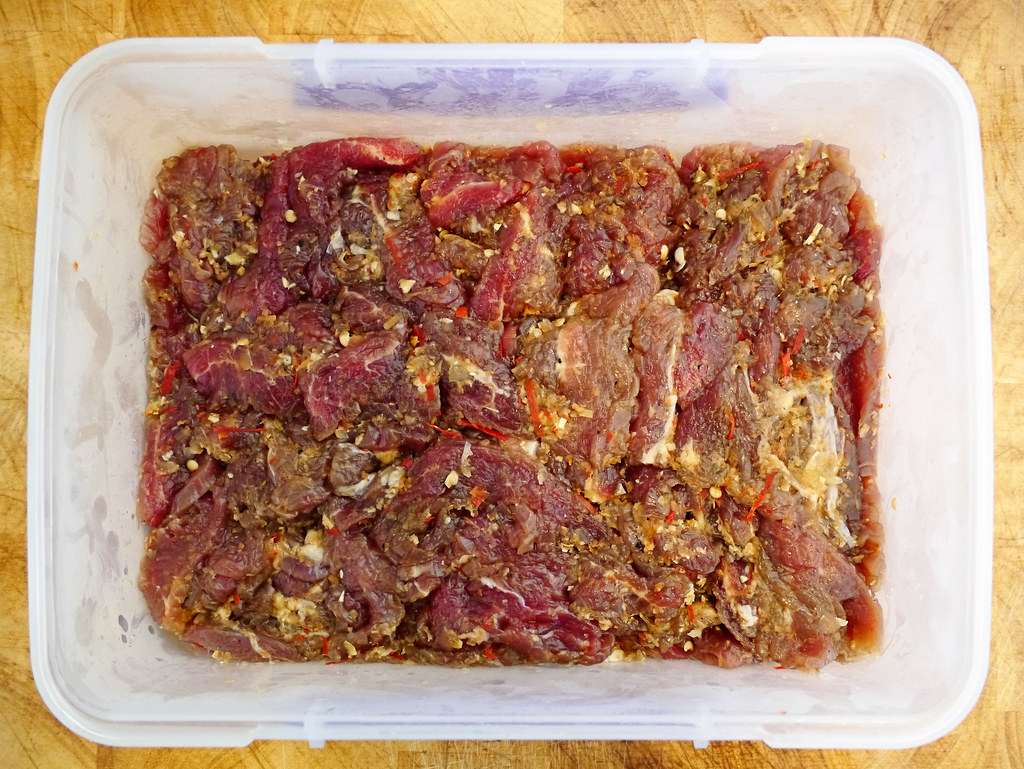
Approx. 22 hours after marinating in the fridge.
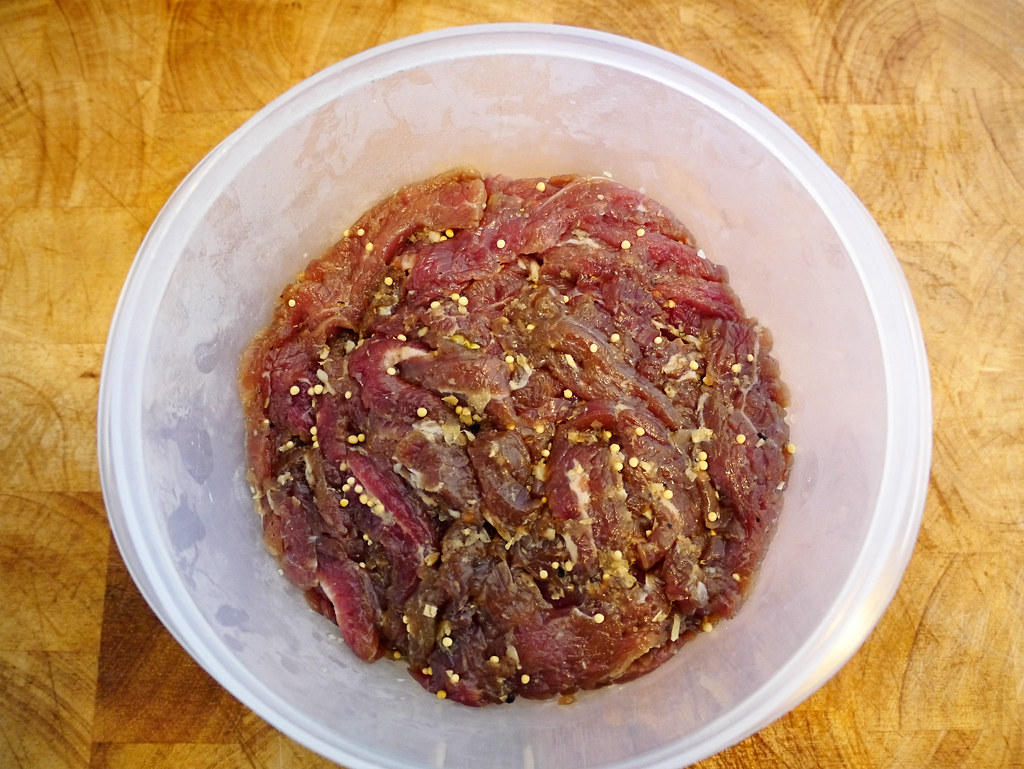
Approx. 22 hours after marinating in the fridge.

When the beef strips are ready for drying, arrange them neatly on the dehydrator trays. Make sure that the beef strips do not touch nor overlap each other, and that you leave enough room between them to allow hot air to flow through.
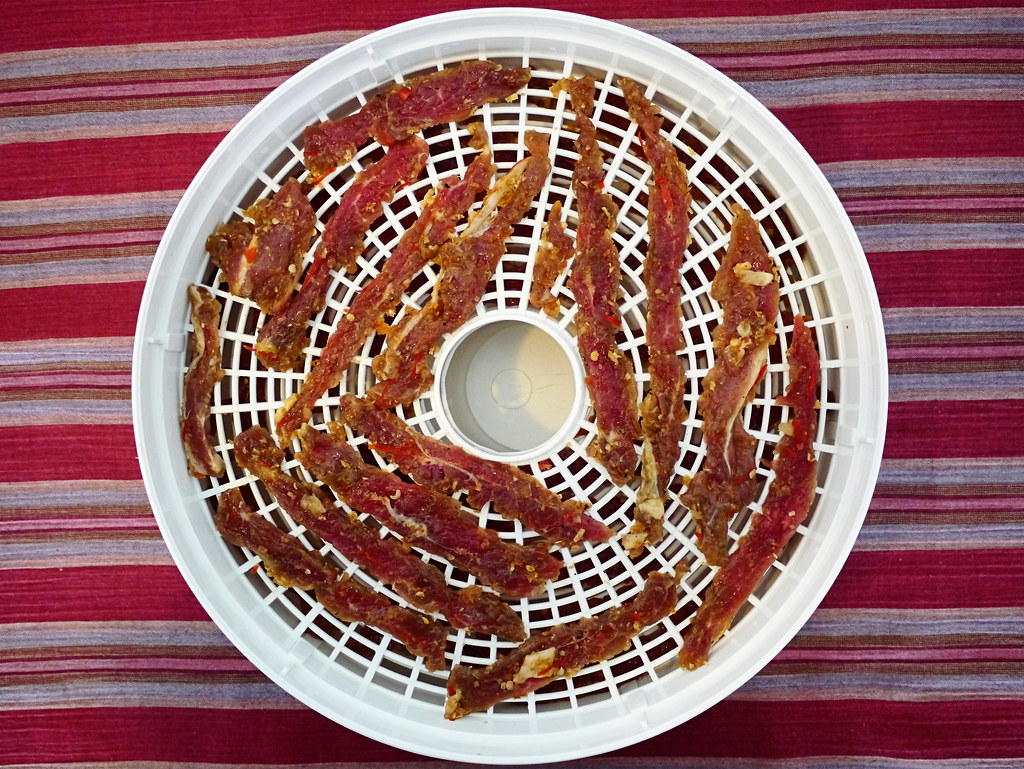
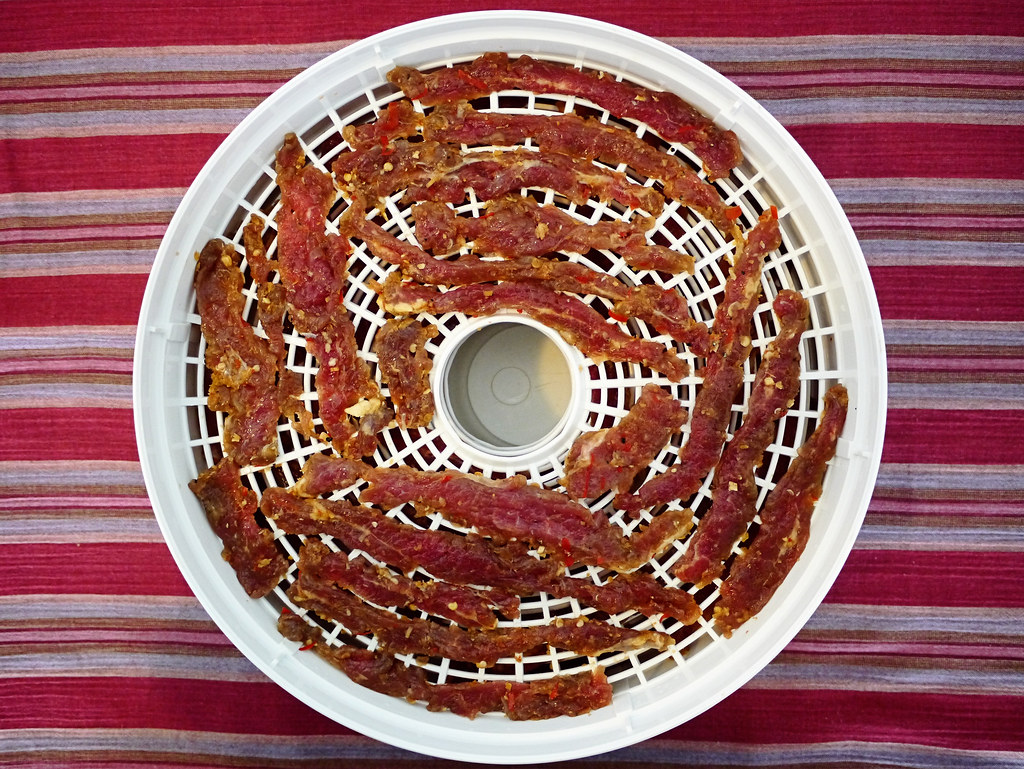
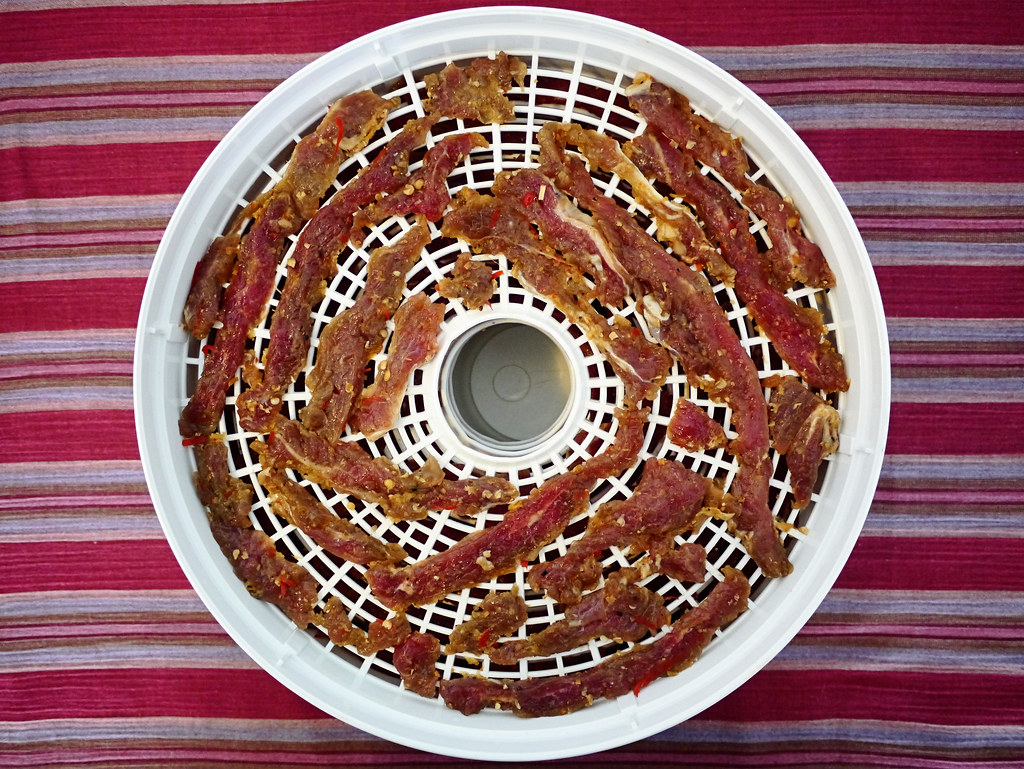
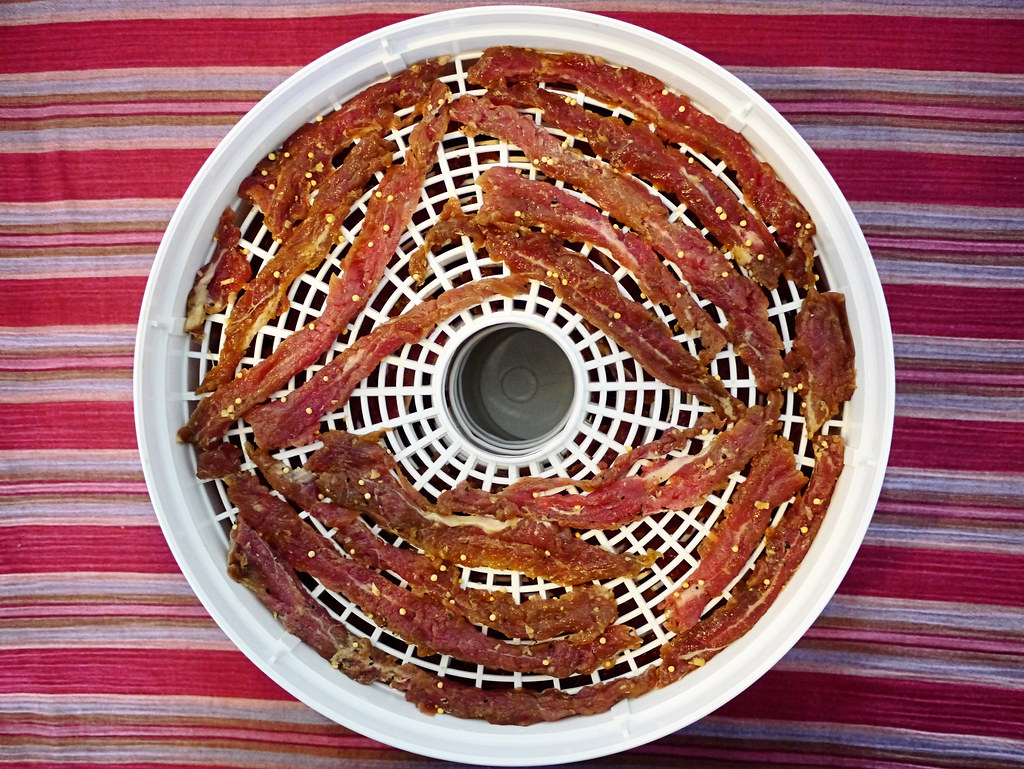
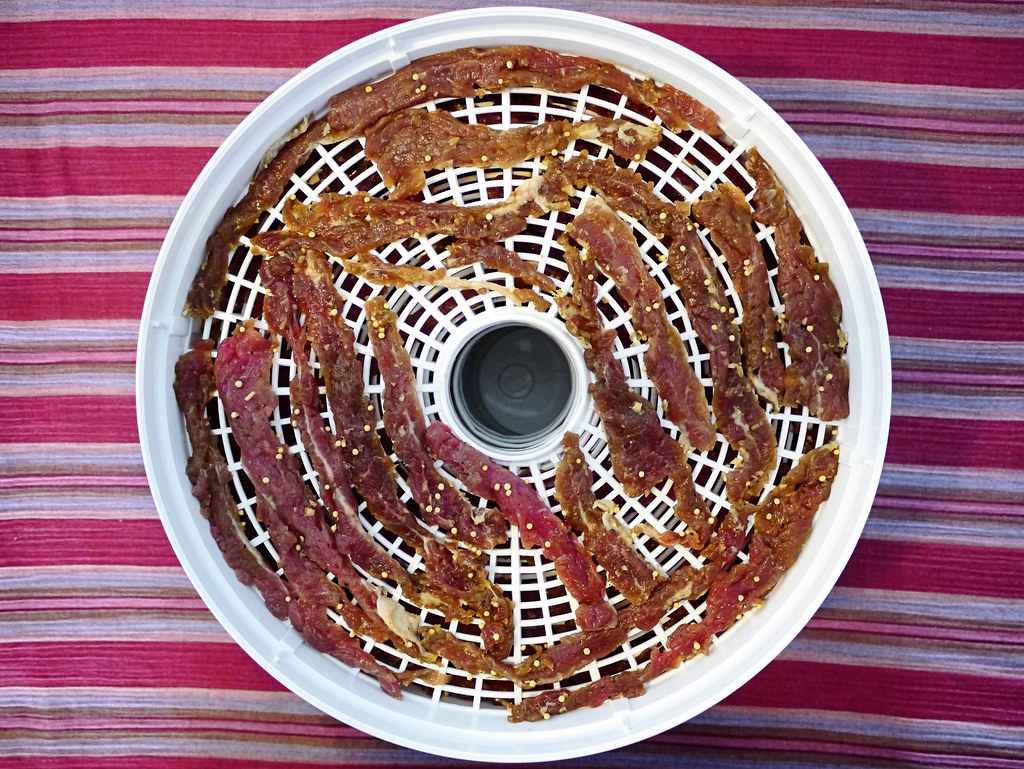
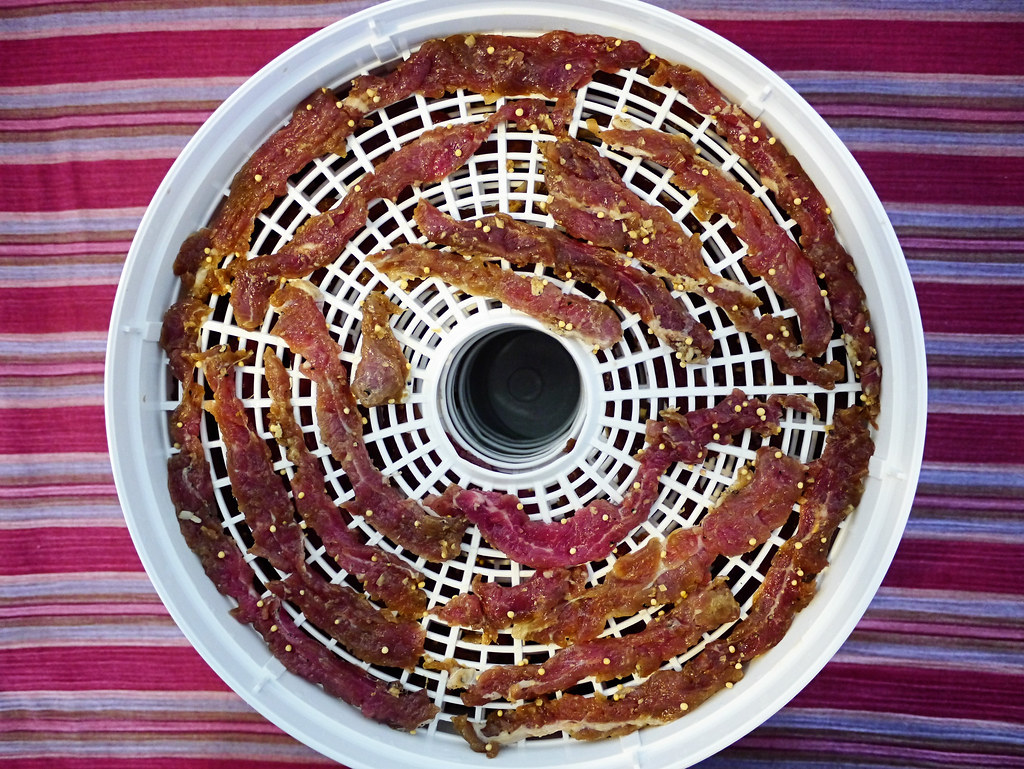
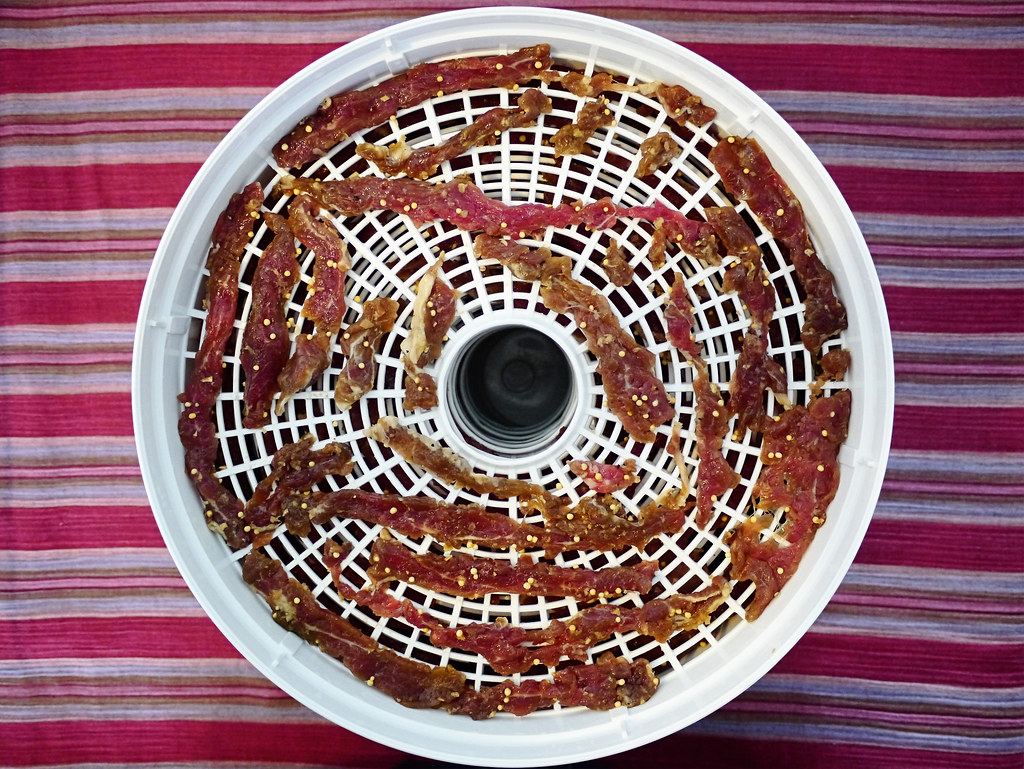
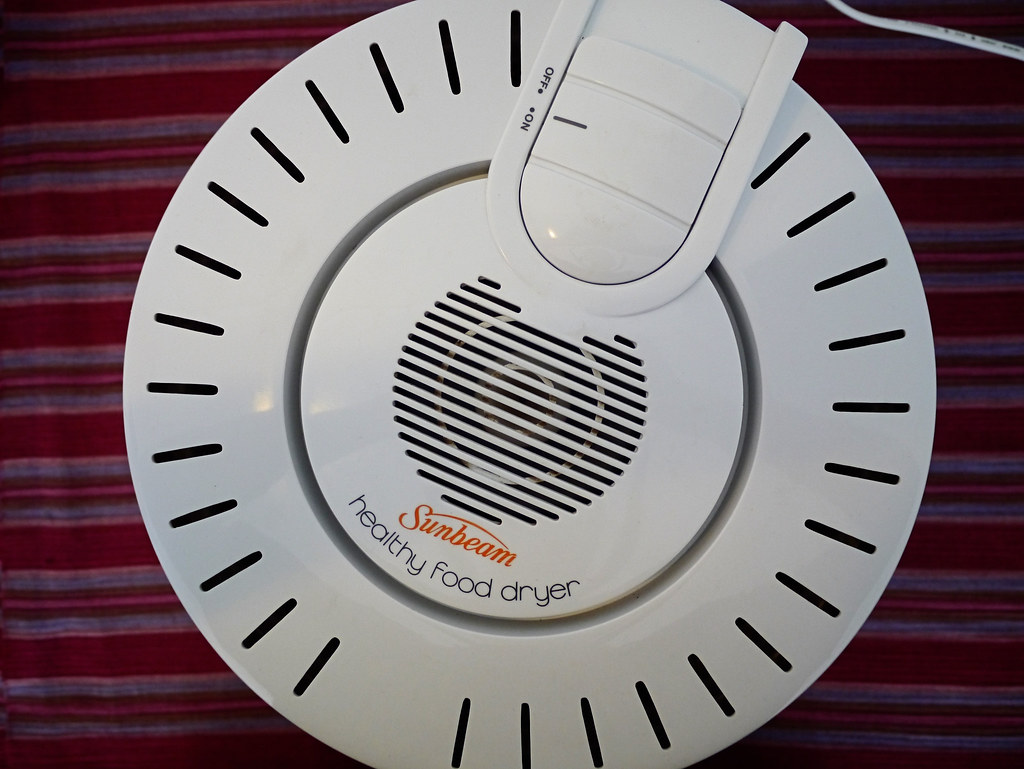
Turn on the dehydrator and set the temperature and time according to the instructions/user manual for drying meat. The time varies depending on the dehydrator that you use, how thick your beef strips are and how much you’re drying. My machine takes about 6 hours to dry 8 trays of 1 kg of flank steak strips. Remember to alternate the trays to ensure even drying. On my machine, the bottom trays usually dry faster than the top trays. Alternatively, you can use an ajar oven at lowest setting/heat.
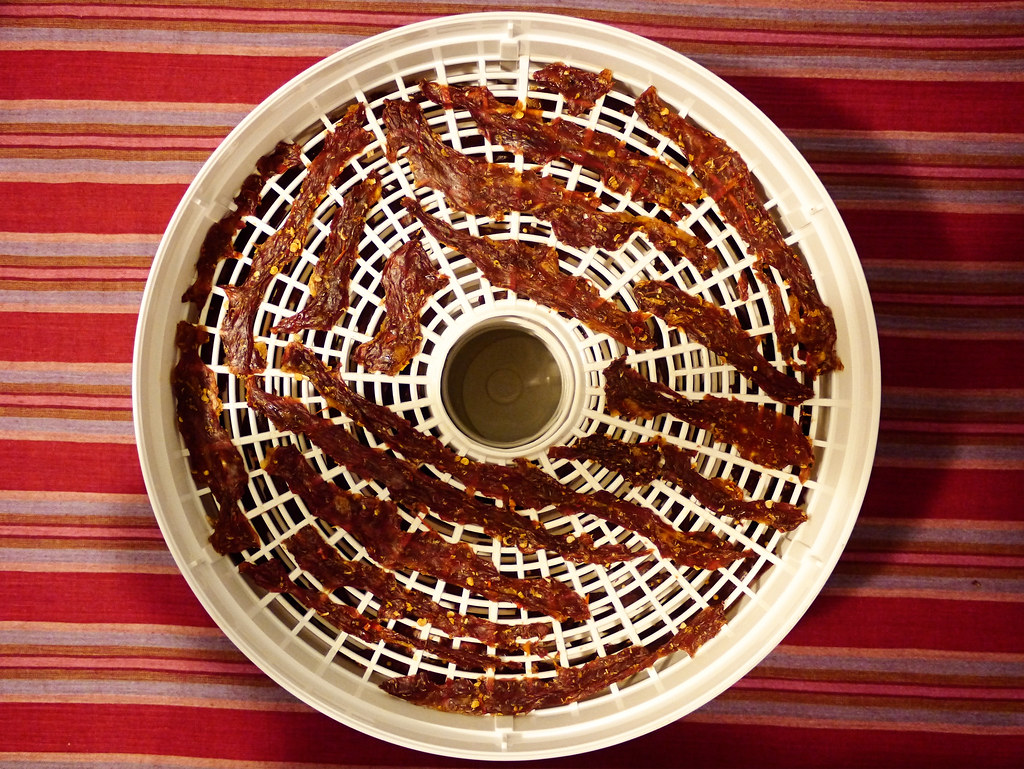
The beef jerky is ready to eat when it is fully dry and dark brown in colour throughout. They should still be slightly pliable. Yum! smile Let the beef jerky cool down completely before gently removing them from the trays and then storing them in an airtight container or zip lock bag in the fridge.
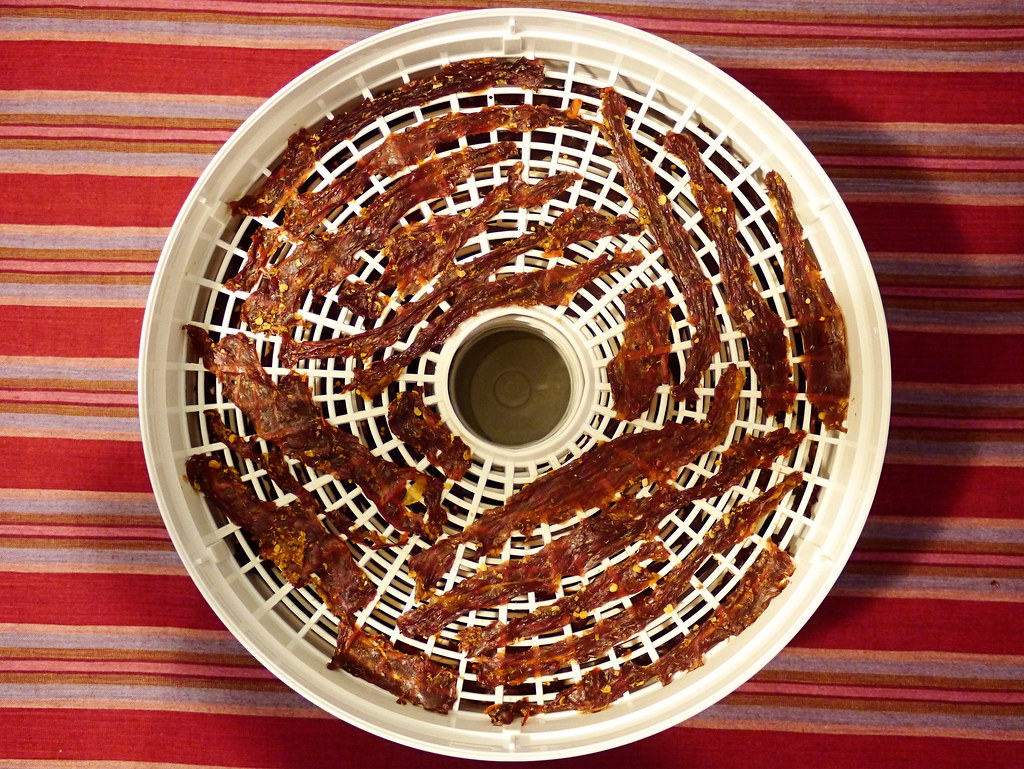
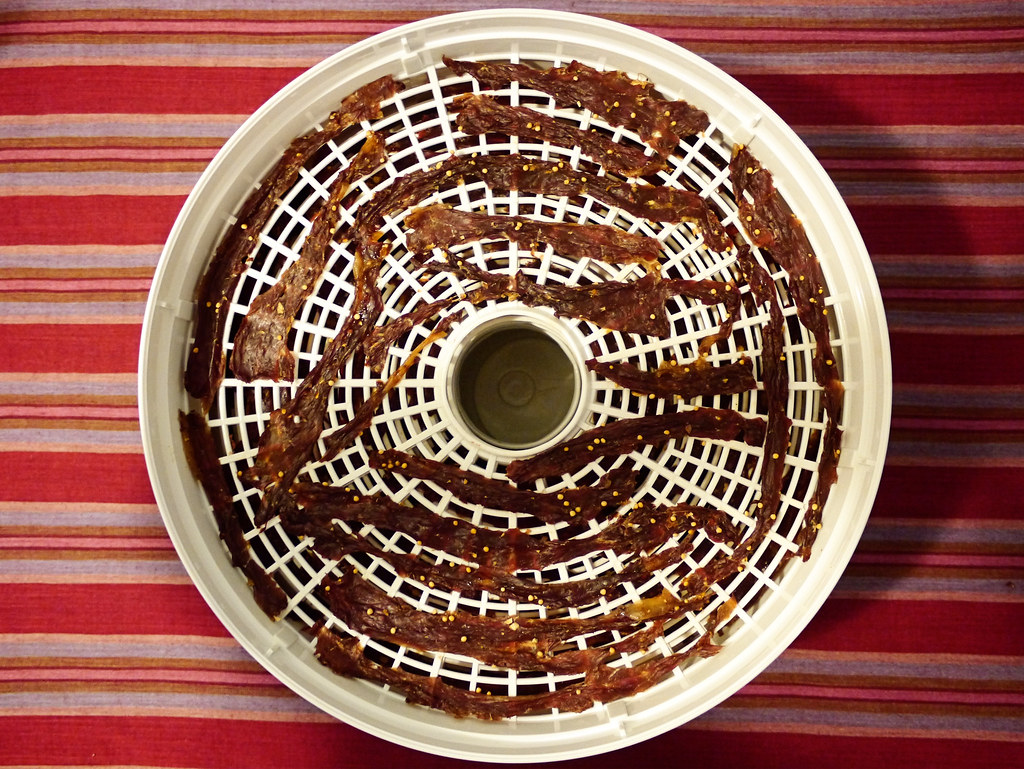
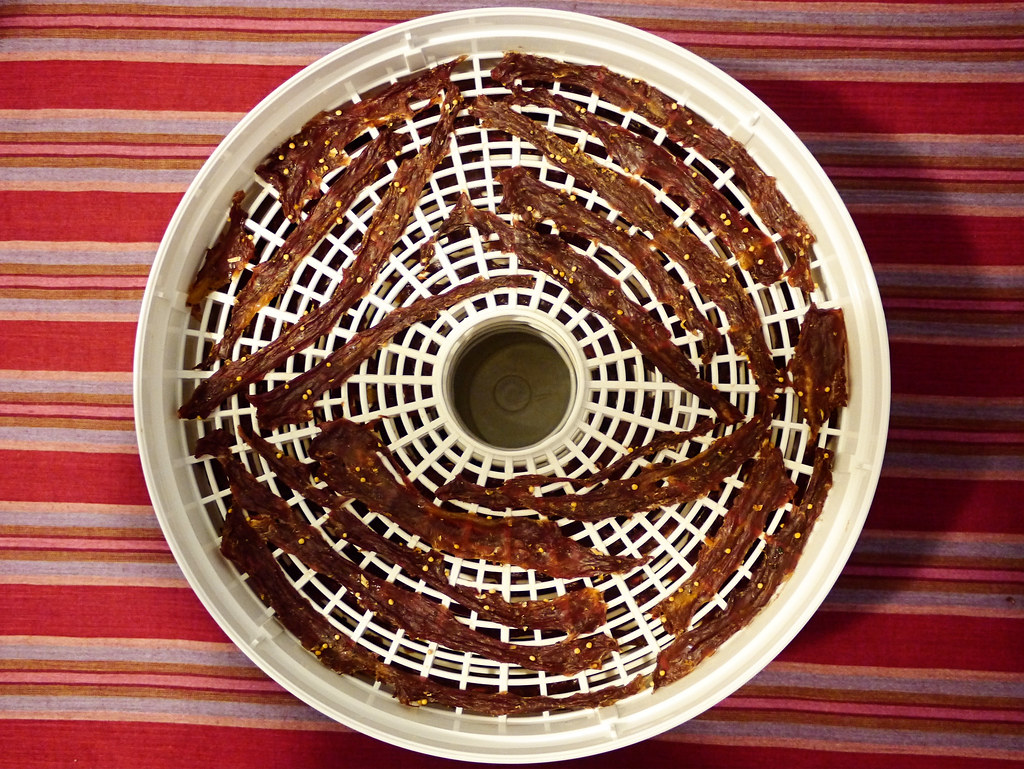
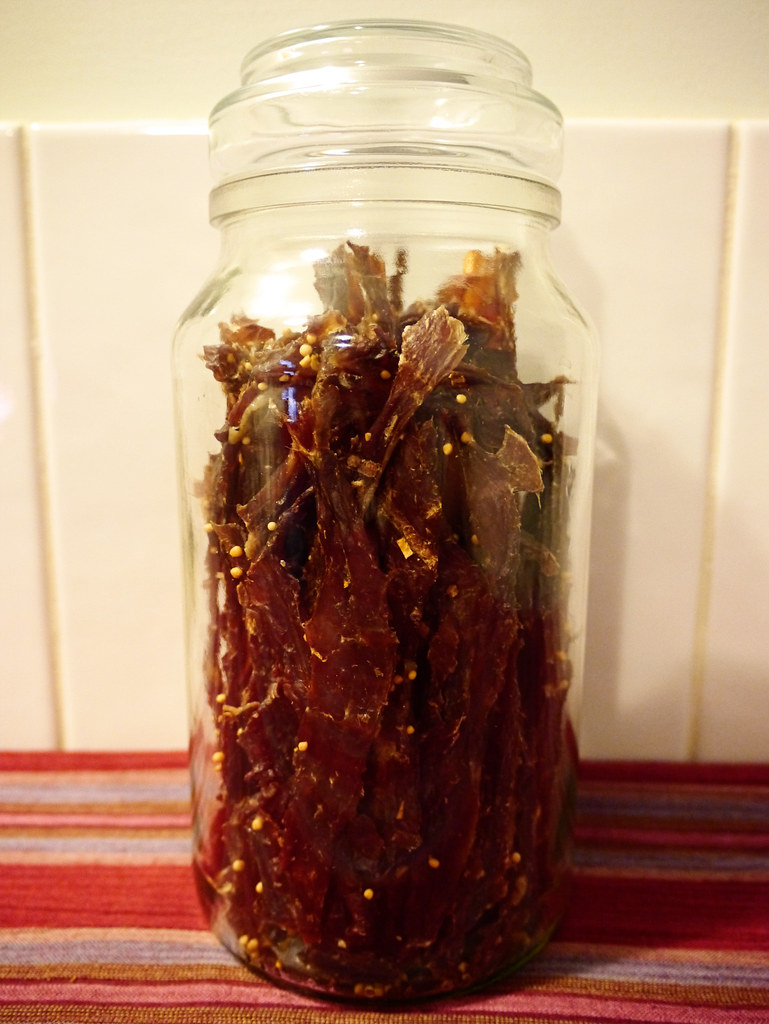
Enjoy your tasty beef jerky as a delicious protein snack or as an accompaniment with tum som/tum mark hoong, sticky rice, etc. Take them with you when you go camping or bush walking or fishing. Sern saab!! bigsmile
Beef Jerky Recipe #2
- 500 grams of flank steak (thinly sliced)
- 1 tsp of minced garlic
- 1 tsp of minced ginger
- 1 tsp of minced fresh red bullet chilies
- 1 tsp of minced lemongrass
- cracked black pepper
- 2 TBSP of fish sauce
- 1 TBSP of padaek/fermented fish sauce
- 1 TBSP of brown sugar
- Place the flank steak in the freezer for 1 hour to firm it up and make it easier to slice.
- Finely slice/dice the garlic and ginger into small pieces. Pound with a mortar and pestle to a fine/minced consistency.
- Finely slice/dice the fresh chilies and lemongrass into small pieces. Pound with a mortar and pestle to a fine/minced consistency.
- With a sharp/filleting knife, trim the fat/sinew off the flank steak if necessary. Then, thinly slice the steak into 5 mm strips. You can either cut across the grain or along the grain. I chose to cut across the grain to make the beef jerky easier to chew!
- Place the beef strips in a mixing bowl. Add the pounded/minced garlic, ginger, fresh chilies and lemongrass. Add the cracked black pepper, fish sauce, padaek/fermented fish sauce and brown sugar. Gently mix the ingredients well together with your hand/fingers. Try not to break up/pull apart the beef strips when mixing.
- Place the mixed beef strips in a plastic container/zip lock bag and seal. Place in the fridge and let the beef strips marinate for 12-24 hours (or overnight).
- When the beef strips are ready for drying, arrange them neatly on the dehydrator trays. Make sure that the beef strips do not touch nor overlap each other, and that you leave enough room between them to allow hot air to flow through.
- Turn on the dehydrator and set the temperature and time according to the instructions/user manual for drying meat. The time varies depending on the dehydrator that you use, how thick your beef strips are and how much you're drying. My machine takes about 6 hours to dry 8 trays of 1 kg of flank steak strips. Remember to alternate the trays to ensure even drying. On my machine, the bottom trays usually dry faster than the top trays. Alternatively, you can use an ajar oven at lowest setting/heat.
- The beef jerky is ready to eat when it is fully dry and dark brown in colour throughout. They should still be slightly pliable. Yum!smile
- Let the beef jerky cool down completely before gently removing them from the trays and then storing them in an airtight container or zip lock bag in the fridge.
- Enjoy your tasty beef jerky as a delicious protein snack or as an accompaniment with tum som/tum mark hoong, sticky rice, etc. Take them with you when you go camping or bush walking or fishing. Sern saab!!bigsmile
[[1]]Image Source: Flickr. Title: a hard earned thirst. Photographer: John Harvey. Taken on September 2, 2006. License: Creative Commons license.[[1]]

No way!! This is AWESOME! Who ever would have thought you could DIY beef jerky? You’re a legend! I don’t have a dehydrator but I have a friend that does…..I will be borrowing it for sure!!
Hi Nagi,
Thanks for your comment! I love beef jerky of all sorts and can go through a scary amount/several packets in one sitting. Works out well to make my own so I can gnaw them at leisure. Still great to try new brands/flavours when we’re out though. Good thing with home made ones is that you can make a lot and keep the rest in the fridge, and add your favourite ingredients/spices. Recipe #1 is a very good one to try. ;) I hope you give making them a go. Best wishes! :)
Great idea and recipe, Padaek! Love the photos, as usual! Love this jerky and will try it soon :)
Julie
Gourmet Getaways
Hi Julie,
Thanks for your comment. Love eating beef jerky as a bar/beer snack and they’re great to accompany many Lao dishes too esp. tum som. You can dry anything really and most cuts of meats work well. Sweet, spicy, salty, seeded, you name it. Always great to experiment with new brews too. The lemongrass gives the dried jerky a very delicious taste! I hope you’ll give them a try. Best wishes. :)
Wow making your own beef jerky is an awesome idea!